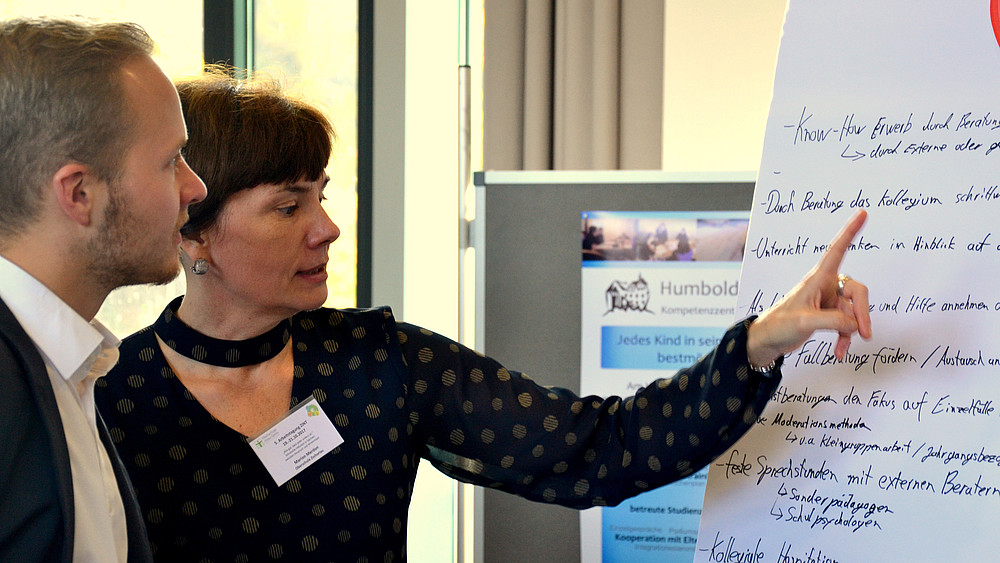Numerous former and active participants met at the 5th ZINT Workshop at the HSZG for a lively exchange.

From October 19 to 21, 2017, the 5th workshop of the "ZINT - Developing inclusive schools together" project took place in Görlitz. Under the motto: "How good that everyone is different!", numerous former and active participants in the certificate courses met again to discuss the current situation of inclusion in schools in Saxony with integration consultants, school supervisory staff, those responsible for the integration and inclusion of pupils with intellectual disabilities in mainstream schools and special needs teachers.
After an open arrival with initial discussion groups on school-related topics such as "Working together or collaborating" or "Support in difficult times - what or who helps?", the rector of the university, Prof. Dr. Friedrich Albrecht, opened this year's conference with a traditional welcome address. Ralf Berger, Director of the Saxon Education Agency, also warmly welcomed the approximately 130 conference participants who had come to Görlitz from all over Saxony, as well as the speakers from all over Germany and the Netherlands.
They both gave the starting signal for two varied, intensive and enriching days. Under the direction of Mario Friedrich, the KIB e.V. once again took over the moderation of the conference. We would like to take this opportunity to thank the moderators for their successful moderation.
The main speaker at the conference was Janis McDavid, who addressed the audience in a modern, surprising way. The 26-year-old student addressed the topic of self-acceptance and the question of how to take life into one's own hands in unprecedented depth. In his opening speech, he gave a moving account of how he creatively puts his life "on its own two feet" and constantly challenges himself. For example, he is often on the move in his own car and lives in a non-accessible shared flat in Berlin because he loves the flair of the big city. According to McDavid, who was born without arms and legs, the key to inclusion lies in the will to find solutions and the attitude to overcome boundaries.
The conference participants took these thoughts with them into the six practical workshops in the early afternoon: "Inclusive schools in Saxony - developing new visions" with Nancy Kallenbach, "How are inclusive schools developing in the Netherlands?" with Simon Ettekoven, "The Janusz Korczak School Center - an example of inclusive school development" with Martin Degner, "Schkola Schulverbund - a school on the way" with Ute Wunderlich, "Inclusion in work and career" with Janis McDavid, "Individual support for particularly gifted pupils" with Dr. Heike Petereit and Heike Wünsche and "Leading and advising schools - cooperation with external partners as the basis for successful inclusive school development" with Klaus Seifried.
In his presentation on techniques for moderating networks, Jörg Heidig, communication psychologist and chairman of the board of KIB e. V., explained how to initiate and design network structures and used practical examples to illustrate important principles for implementation. After a short coffee break, these insights could be put into practice. There was a lively exchange of experiences between the conference participants in the regional network groups.
The evening event in the "Lucie Schulte" restaurant brought the first day of the conference to a close. After a rhythmic performance by pupils from the Friedrich-Jahn-Schule Görlitz under the direction of music therapist Claudia Lohmann, Joshua Neumann accompanied the joint dinner on the piano. The main part of the evening was a reading by Sabine Zinkernagel from her book "Wer nur auf die Löcher starrt, verpasst den Käse". She talked about her experiences of everyday family life with two special boys. At the end of the day, there was another opportunity to talk to each other.
The second day of the conference began with a large group workshop in the university canteen, a first. Simon Ettekoven, himself a teacher and principal for many years and author and co-developer of the learning strategy "Cooperative Learning", presented this effective method of acquiring and transferring knowledge and invited the conference participants to take part in this personal learning experience in groups of four.
In his closing speech, Klaus Seifried once again addressed education policy in Germany as a whole and in Saxony in particular. He aptly explained the state of development of inclusion in comparison to the individual federal states, formulated necessary requirements and declared Germany to be a "developing country" from a "school psychology perspective". Gerald Heinze, Head of Department for Middle and Secondary Schools at the Saxon Ministry of Culture and Sport, gave the closing speech. At the end of the conference, he once again answered questions from the conference participants in a heated discussion on the current situation between teacher shortages and absenteeism at Saxon schools. Exhausted, but with the agreement to stay in touch, this year's conference ended with an invitation to the 6th ZINT conference in 2018, the 10th anniversary of ZINT.